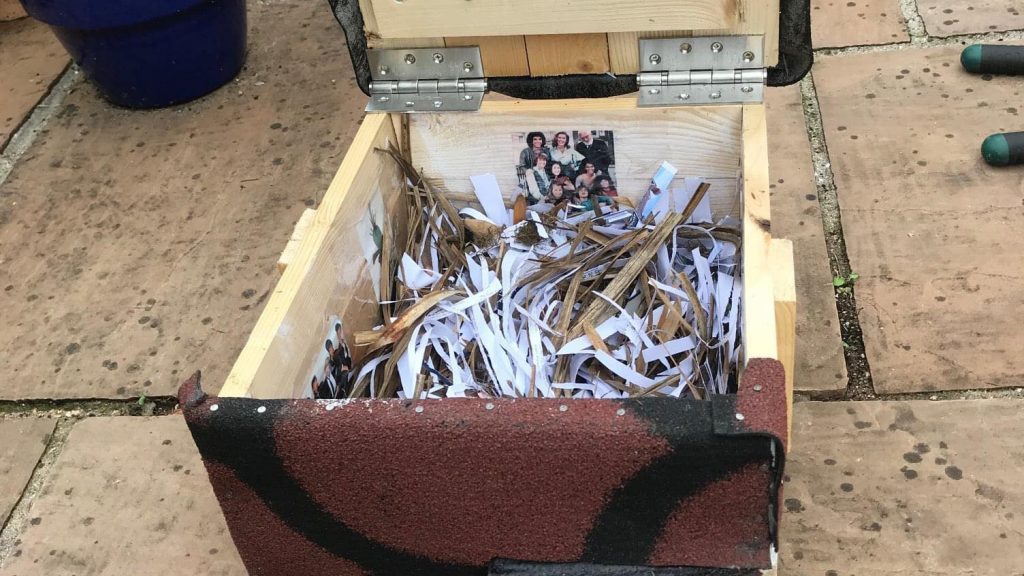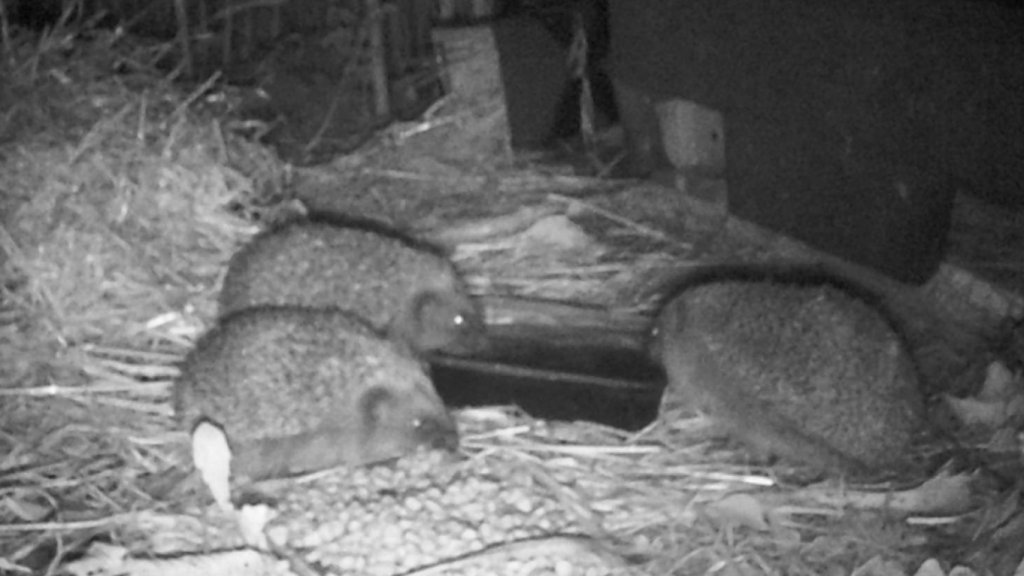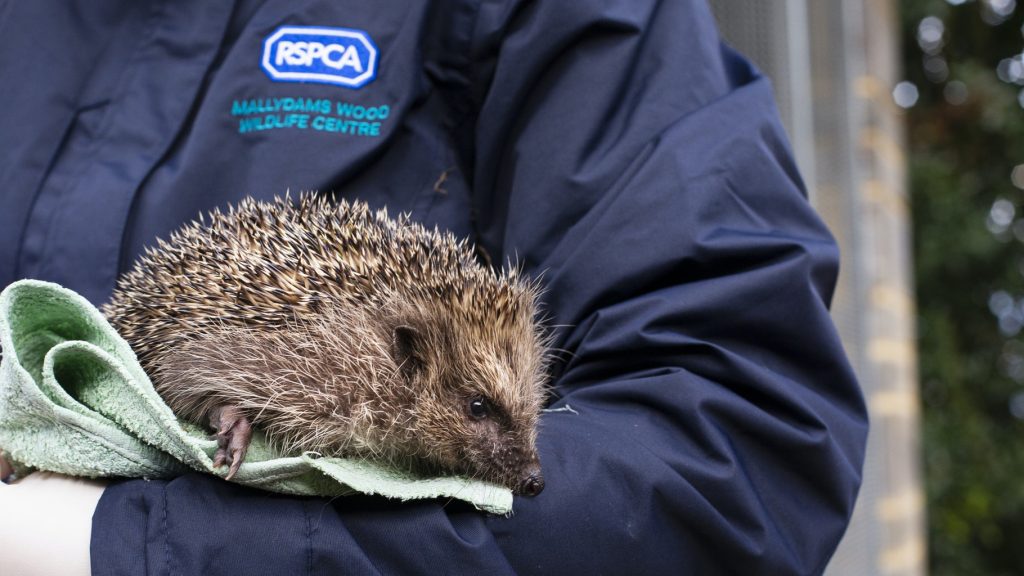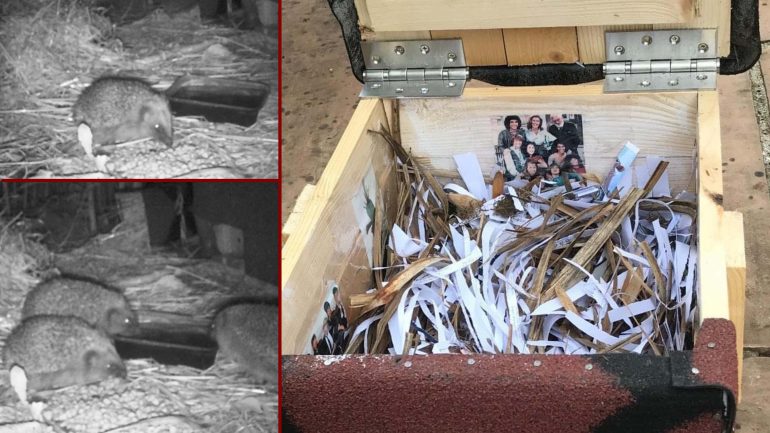Spike in population as TEN of the creatures move in to the homes which have a unique 80s theme
A FATHER of two from Morganstown who has three hedgehog houses, complete with retro décor “in case the hedgehogs appreciate ‘80s TV”, has noticed a recent increase in hedgehogs visiting his garden.
There are about ten hedgehogs, including two hoglets, regularly visiting the houses, with some of them having made their homes there.
Chris Chadwick, 51, is an environmental manager at Dow Silicones in Barry. He built his first hedgehog house in 2020, when he first noticed a hedgehog in his garden at Fford Y Berllan in Morganstown. Last year, he spotted four hoglets and built two more houses to help them survive the winter.

“The building of the houses was relatively straightforward,” he said. “It’s basically creating a wooden box, with a 15cm-by-15cm entrance, big enough for hedgehogs but too small for cats and then attaching a hinged lid, which is handy to allow easy access for cleaning. I painted the wood and covered it with roofing felt.”
He placed the houses in a sheltered area of his garden on a base of bricks to stop them getting wet in bad weather.
Once the structure of the houses was complete, Chris got creative and decided to “have a bit of fun” with decorating – by adding images from ‘80s TV shows to the interiors. He told the Cardiffian: “I think it’s well documented that hedgehogs like Fame!”
He has two cats, Tigsy and Millie, who “love to watch” the hedgehogs – but they “never get involved,” Chris explained.
Chris started taking care of the hedgehogs after he found some hoglets in his garden. He decided to look after them himself and now has “a very healthy population” of hedgehogs in his garden.

According to the RSPCA, “hedgehog populations are thought to be falling rapidly, particularly in rural areas. They’re now considered vulnerable to extinction in Great Britain.”
Chris thinks that wildlife conservation is an area which could improve in South Wales and that there should be more community effort to look out for hedgehogs.
Hedgehogs hibernate in the winter, but Chris suggested that people could create “hedgehog corridors” between their gardens, by making a small hole in their fences to allow hedgehogs to come and go freely during the times of year when they are active. This, he said, could also stop them from risking their lives on busy roads.
Chris said that most of the hedgehogs found their way to him through a hedgehog corridor in his back fence, which connects his garden to a small, wooded area.
Chris owns a 35-acre nature reserve, Cadoxton Ponds, which is on the northwest side of the large chemical complex where he works.
He was part of a team that built the reserve nearly 20 years ago and said that helping to manage it has given him “some association to conservation”.
“I’m just interested in conserving wildlife, at home and in work. It is an absolute pleasure to have the hedgehogs visiting my garden,” he said.
The RSPCA’s scientific officer Evie Button said: “We receive more calls about hedgehogs than about almost any other wild mammal.”
Evie explained what people should do if they spot hoglets on their own: “Generally, it’s best to leave them alone as they’ll likely be looking for food, but there are a few things you can do to check if the hoglet does need help. If they’re larger than apple-sized (about 300g) and they’re not in immediate danger, sick or injured, monitor from a distance. If you’re concerned, you can try offering food and fresh water. The best type of food to give hedgehogs is cat or dog food.”
However, you should contact the RSPCA if you see a hoglet that’s smaller than an apple, or is sick, injured or in immediate danger.
An RSPCA Cymru spokesperson said: “If you find a hedgehog in danger, please get in touch with our advice line on 0300 123 4999. It may be quicker however, if there isn’t an immediate danger to the hedgehog, to contact your nearest wildlife rehabilitator as soon as possible. It is often faster to take an animal to a wildlife rehabilitator yourself, as our officers may be out of the area attending other calls.”

In 2021, the charity’s national helpline received 6,120 calls about sick, injured and orphaned hedgehogs, with 126 of those calls coming from Cardiff and a further 28 from the Vale of Glamorgan. This worked out as an average of 17 calls about hedgehogs every day.
Of the hedgehogs admitted to RSPCA wildlife centres, two thirds were sick or injured, and one third had been orphaned.
To keep hedgehogs safe in your garden, remember to remove sports and fruit netting, cover drains and holes, check before using a strimmer or mower, look in compost heaps before forking them over and avoid using slug pellets as these are poisonous to hedgehogs.



